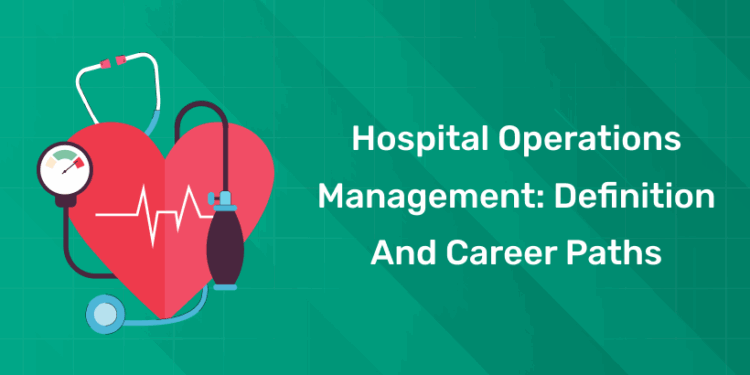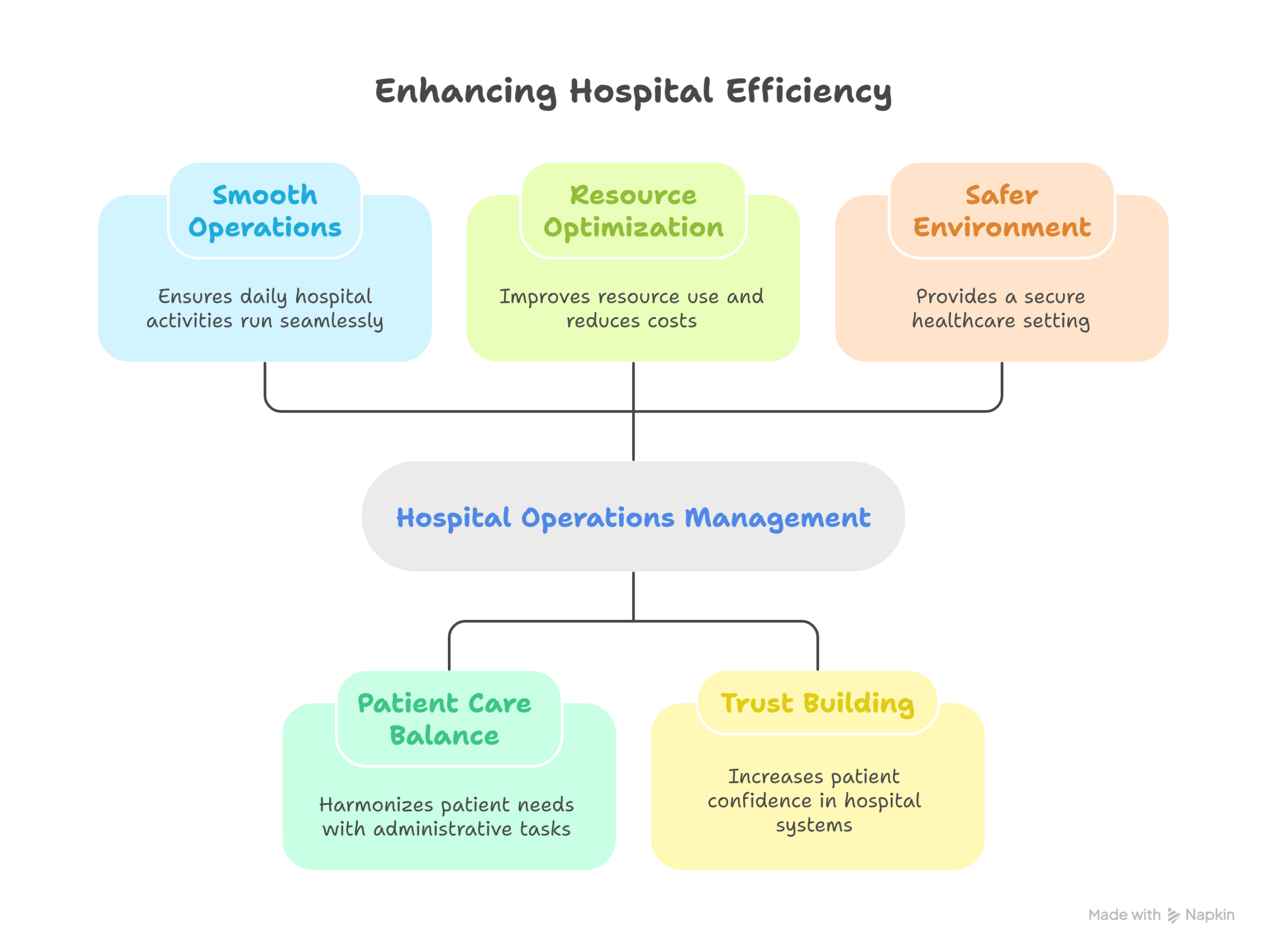Table of Contents
Hospital operations management keeps hospitals running every single day. It focuses on smooth systems and reliable patient services. Doctors treat patients, but operations managers run the hospital. They plan resources, manage staff, and improve healthcare processes. Hospitals need strong people who can handle these critical responsibilities. Without effective operations management, hospitals face confusion and inefficiency. This role ensures patients get timely and quality care. It links clinical expertise with smart administrative decision-making.
The healthcare industry offers many rewarding career opportunities. Hospital operations management opens doors to growth and impact. This field needs skills in leadership, planning, and analysis. It also requires knowledge of healthcare laws and systems. Careers range from administrators to patient service managers. Salaries are strong with global opportunities for advancement. With training and effort, success is very achievable.
What this blog covers:
- Definition and meaning of hospital operations management.
- Key roles and responsibilities in daily hospital functions.
- Importance of operations management in healthcare delivery.
- Important skills required for future operations managers.
- Career graphs in hospitals, clinics, and consultancies.
- Salary trends and global growth opportunities explained.
- Steps to start a career in this field.
Explore Your Future in Hospital Administration! Enroll now
Introduction
Hospital is a place where many things happen daily. Here Doctors and nurses focus on treating patients. But behind the scenes, systems must run without interruption. This is where hospital operations management plays a big role. It keeps services smooth, resources ready, and staff coordinated always. Without strong operations, hospitals can struggle with even simple tasks. Good management ensures patients receive care at the right time.
Hospital operations management also brings order to complex healthcare systems. It connects patient needs with staff, technology, and hospital facilities. Every process, from admissions to discharge, requires proper coordination daily. This field helps hospitals save costs while improving patient safety. It balances efficiency with compassion, creating trust between staff and patients. The ultimate goal is quality care with smooth hospital functioning. When systems are strong, everyone benefits, from staff to society.
Key Highlights of Hospital Operations Management
- Ensures hospitals run smoothly every single day.
- Balances patient care with administrative responsibilities.
- Reduces costs
- Improves resource use.
- Increases trust between patients and hospital systems.
- Provides a safer healthcare environment.
What is Hospital Operations Management?
1: What is the primary role of a hospital administrator?
It is about keeping hospitals organized and efficient. They focus on making sure that the services run without daily issues. This field covers planning, coordination, and proper use of resources. The aim is simple: better care with smoother hospital functioning.
Core Meaning
Hospital operations management connects medical care with administration. It supports doctors and nurses by handling background operations. Every activity, big or small, falls under this system. Good management creates balance between patient needs and hospital goals.
Key Areas of Focus
- Resource Use
- Manages staff, equipment, and hospital facilities.
- Prevents shortages that disrupt patient care and safety.
- Process Coordination
- Aligns admissions, treatment, and discharge smoothly.
- Reduces delays and confusion in daily operations.
- Patient Experience
- Ensures shorter wait times and better communication.
- Improves overall trust in hospital systems.
- Compliance
- Keeps hospitals aligned with laws and regulations.
- Protects both patients and staff from risks.
Why It Matters
It makes complex systems work as one. Reduces errors and saves money. Improves patient safety. Without it, hospitals face chaos. Patient services become unreliable. With it, healthcare becomes efficient. And also safe, and patient-centered.
Hospital Administration Course with Assured Career Growth
Hospital Administration Course by Entri App: Master essential healthcare management skills, gain certification, and secure top roles in leading hospitals
Join Now!Key Roles and Responsibilities in Operations Management
Hospital operations management is about making sure everything works daily. It gives order to hospital systems that serve patients. Operations managers handle many tasks that keep hospitals safe and efficient. These tasks are connected with staff, patients, and hospital resources. Let us look at the main roles and responsibilities.
1. Managing Daily Hospital Workflows
Hospitals are busy with activities every single day. Operations managers ensure these activities run without major problems. They design systems that help staff finish tasks on time. They also remove delays that could harm patient experiences.
Main Duties:
- Oversee hospital schedules for staff and patients.
- Coordinate between departments for smooth communication.
- Check that hospital services run on proper timelines.
2. Coordinating Staff and Teams
Hospital depend on teams of doctors, nurses, and workers. Operations managers help coordinate these teams effectively every day. They make schedules that avoid staff overload or shortage. Good coordination makes patient care smoother and more reliable.
Main Duties:
- Prepare and manage staff duty rosters.
- Balance workload among different hospital departments.
- Solve conflicts that disturb teamwork and coordination.
3. Ensuring Compliance with Regulations
Healthcare must follow laws and safety standards always. Operations managers make sure hospitals comply with these rules. This protects patients, staff, and the hospital’s reputation too. It also avoids penalties and legal risks in operations.
Main Duties:
- Track changing healthcare policies and update systems.
- Keep hospital records correct and ready for audits.
- Train staff to follow ethical and safe practices.
4. Managing Supplies and Equipment
Hospital uses medicines, tools, and machines every day. Operations managers ensure these are always available and maintained. Without supplies, patient care suffers and delays become common. Strong supply management makes the hospital run efficiently daily.
Main Duties:
- Track and order medicines, tools, and machines.
- Timely procurement and planning, preventing shortages.
- Sustain equipment for safe and long-term use.
5. Monitoring Quality of Services
Quality care is at the center of healthcare systems. Operations managers work to keep hospital services high-quality. They measure patient satisfaction and improve weak areas quickly. The goal is safe, reliable, and trusted healthcare services.
Main Duties:
- Monitor patient feedback & act on complaints.
- Review processes for accuracy & patient safety.
- Train staff for consistent service improvements.
6. Financial Oversight
Hospital must balance costs while serving patients properly. Operations managers take care of budgets. They control unnecessary spending. These managers find ways to save money without reducing quality. This protects both hospital growth and patient trust long-term.
Main Duties:
- Prepare and monitor hospital budgets regularly.
- Reduce wasteful spending in daily operations.
- Plan cost-effective use of resources and staff.
Table: Roles and Key Responsibilities
| Role | Key Responsibility |
|---|---|
| Daily Workflow Manager | Ensure schedules and tasks run smoothly |
| Staff Coordinator | Balance workloads and manage staff rosters |
| Compliance Supervisor | Keep hospitals aligned with healthcare laws |
| Supply Manager | Track and maintain medicines, tools, machines |
| Quality Monitor | Improve patient care and service standards |
| Financial Overseer | Control budgets and reduce unnecessary spending |
Example in Practice
Imagine a hospital without strong operations management. Doctors may face missing supplies during patient treatment. Patients could wait hours because of poor scheduling. Staff may feel stressed from unbalanced workloads daily. Such issues harm patients and the hospital’s reputation.
Now, imagine a hospital with good operations management. Patients move smoothly from registration to treatment and discharge. Supplies and machines are ready when doctors need them. Staff follow schedules that reduce stress and improve care. This gives a safe, efficient, and trusted healthcare space.
Final Thoughts
Operations managers have heavy but important responsibilities in hospitals. They balance staff, patients, resources, and regulations. Without them, hospital cannot provide safe and timely care. Their roles are the backbone of hospital functioning worldwide. Strong operations management means better hospitals for every community.
Importance of Operations Management in Healthcare
It plays a key role in healthcare success. It ensures hospital functions smoothly every single day. Patients, staff, and resources are benefited from proper management. Without it, hospitals may face delays and inefficiencies. This section explains why it is essential for hospitals and patients.
1. Ensures Smooth Patient Care
Patients expect timely and safe healthcare services. Operations management makes sure these expectations are met daily. It organizes staff, schedules, and resources for efficiency. Delays are reduced, and patients receive treatment promptly.
Key Points:
- Proper workflow reduces long waiting times.
- Staff know their tasks clearly and follow schedules.
- Emergency cases are managed without confusion.
- Patient satisfaction and trust in hospitals improve.
2. Optimizes Resource Use
Hospitals use staff, medicines, and equipment every day. Operations management ensures these resources are used wisely. It prevents shortages, waste, or idle equipment. This saves costs and improves hospital efficiency.
Subpoints:
- Tracks medicine and equipment inventory accurately.
- Allocates staff where they are most needed.
- Reduces duplication of tasks or services.
- Supports long-term planning and hospital growth.
3. Improves Staff Productivity
Healthcare workers face heavy workloads and stress. Operations management organizes their tasks and schedules effectively. It ensures staff can focus on patient care instead of confusion. Well-managed hospitals reduce burnout and increase team efficiency.
Key Points:
- Balanced staff schedules prevent overload.
- Clear roles reduce conflicts and misunderstandings.
- Managers provide support and guidance regularly.
- Productivity increases while staff morale improves.
4. Enhances Patient Safety and Quality
Quality care is the most important goal in healthcare. Operations management monitors processes to reduce errors. It tracks safety protocols and compliance with regulations. Patients benefit from safer procedures and consistent treatment.
Key Points:
- Errors in treatment or medication are minimized.
- Safety protocols are followed across all departments.
- Feedback systems improve processes continuously.
- Trust between patients and hospital staff strengthens.
5. Reduces Costs and Increases Efficiency
Hospitals must manage budgets carefully to remain sustainable. Operations management identifies areas where costs can be reduced. It balances efficiency with quality care for better outcomes. Well-managed hospitals can serve more patients with available resources.
Subpoints:
- Reduces unnecessary spending on staff or equipment.
- Streamlines processes to avoid duplication of work.
- Prevents wastage of medicines and supplies.
- Supports strategic planning and hospital expansion.
Table: Importance of Operations Management
| Area | Benefit to Hospital |
|---|---|
| Patient Care | Timely treatment and higher patient satisfaction |
| Resource Management | Efficient use of staff, equipment, and supplies |
| Staff Productivity | Better morale, reduced burnout, increased output |
| Safety and Quality | Fewer errors, safer patient care |
| Cost Efficiency | Reduced waste, optimized budget |
Final Thoughts
Operations management is essential for hospital success today. It improves care quality, reduces costs, and supports staff. Hospitals with strong management deliver better results to patients. It creates a safer, more efficient, and trusted environment. Investing in operations management benefits patients, staff, and hospitals.
Essential Skills for Hospital Operations Managers
They play important role in healthcare systems. They ensure hospitals function smoothly. Managers also ensure safely, and efficiently. For success, they must have a range of skills. These skills help them handle staff, patients, resources, and processes. Strong skills improve hospital performance and patient satisfaction consistently.
1. Leadership Skills
Leadership is vital for guiding teams and departments effectively. Operations managers must inspire staff to work efficiently together. Good leaders create trust and maintain a positive work environment.
Subpoints:
- Motivate staff to achieve hospital goals.
- Resolve conflicts among team members promptly.
- Guide departments through changes or challenges.
- Set clear expectations for staff performance.
2. Communication Skills
Clear communication is necessary to coordinate staff and patient care. Operations managers act as a bridge between different teams. They must explain instructions and updates clearly every day.
Subpoints:
- Convey schedules, policies, and procedures effectively.
- Listen actively to staff and patient concerns.
- Report issues to higher management clearly.
- Ensure everyone understands their roles and responsibilities.
3. Analytical and Problem-Solving Skills
Hospitals face complex issues that require quick solutions. Operations managers analyze data and identify areas for improvement. They solve problems before they affect patient care or efficiency.
Subpoints:
- Evaluate hospital workflows and patient flow patterns.
- Identify bottlenecks in staff or resource use.
- Make decisions based on data and facts.
- Implement practical solutions to improve efficiency.
4. Time Management Skills
Hospital operations managers handle multiple tasks every day.
Effective time management ensures priorities are addressed properly.
They must allocate time to urgent and routine tasks.
Subpoints:
- Schedule staff, resources, and patient appointments efficiently.
- Avoid delays in critical hospital processes.
- Balance multiple departments and daily operations.
- Meet deadlines without compromising care quality.
5. Knowledge of Healthcare Systems
Understanding hospital operations, policies, and regulations is essential. Operations managers must know healthcare laws and compliance requirements. This knowledge ensures hospitals operate safely and legally.
Subpoints:
- Stay updated on national healthcare regulations.
- Understand hospital policies and internal procedures.
- Ensure staff follows legal and ethical standards.
- Maintain accurate documentation and records.
6. Technology and Data Skills
Technology is widely used in modern hospital management. Operations managers must use hospital software and data tools effectively. This helps track patients, staff, and resources efficiently.
Subpoints:
- Use hospital management software for scheduling and reporting.
- Analyze data to improve hospital operations.
- Monitor inventory and equipment electronically.
- Implement digital solutions for better patient care.
Table: Essential Skills and Benefits
| Skill | Benefit to Hospital Operations |
|---|---|
| Leadership | Motivates staff and improves teamwork |
| Communication | Ensures clear instructions and coordination |
| Analytical & Problem-Solving | Identifies issues and improves processes |
| Time Management | Prioritizes tasks and meets critical deadlines |
| Healthcare Knowledge | Maintains compliance and safe operations |
| Technology & Data Skills | Tracks resources and improves efficiency |
Final Thoughts
Hospital operations managers need a balanced skill set daily. Strong skills improve hospital efficiency and patient experiences. Leadership, communication, and data use are particularly important. Managers with these skills create safer and organized hospitals. Investing in skill development benefits patients, staff, and hospitals.
Hospital Administration Course with Assured Career Growth
Hospital Administration Course by Entri App: Master essential healthcare management skills, gain certification, and secure top roles in leading hospitals
Join Now!Essential Skills for Hospital Operations Managers
Hospital operations managers need many skills for effective work. These skills help them balance people, processes, and resources. Without the right skills, hospital operations can become chaotic. Strong skills improve service quality and patient satisfaction levels. These skills also support compliance with healthcare rules and standards. Below we explore key skills managers should build.
1. Leadership Skills
Managers must guide teams toward clear goals. They inspire staff to deliver quality services. Leaders also help during stressful hospital situations. They provide direction when quick action is needed. Strong leadership improves team spirit and productivity.
2. Communication Skills
Good communication ensures everyone understands their tasks. Managers must speak clearly with doctors, nurses, and staff. They also interact with patients and families effectively. Clear communication reduces confusion and errors. Written communication skills are equally important.
3. Problem-Solving Skills
Hospitals face unexpected issues almost every day. Managers must think fast under pressure. Problem-solving helps avoid delays in patient care. It also improves resource use during emergencies. Critical thinking supports better solutions for complex problems.
4. Organizational Skills
Managers handle many responsibilities at the same time. They need skills to manage schedules, resources, and staff. Organized systems reduce waste and duplication. They ensure patients receive timely services. Organizational strength supports hospital growth and stability.
5. Analytical Skills
Managers use data for informed decision-making. They analyze performance reports and patient feedback. Numbers highlight areas that need improvement. Analytical skills also help in financial planning. Data-driven thinking leads to better hospital efficiency.
6. Negotiation Skills
Managers often negotiate with vendors and suppliers. Strong negotiation ensures cost-effective purchases. It also helps secure better service contracts. Negotiation with staff supports fair conflict resolution. Skilled negotiators balance needs and resources effectively.
7. Adaptability
Healthcare changes often with new rules and technologies. Managers must adjust quickly to these shifts. Adaptability helps them manage sudden crises effectively. Flexible managers also support smoother transitions during reforms. Change readiness is vital in healthcare settings.
8. Decision-Making Skills
Hospital managers make choices affecting patients and staff. Decisions should be fast yet well-informed. Poor decisions can harm patient trust. Good decisions save time and resources. Decision-making skills come from practice and confidence.
9. Emotional Intelligence
Managers handle people under stress or pressure. Emotional intelligence helps them stay calm. It supports empathy with patients and staff alike. Managers with this skill build stronger relationships. Emotional awareness also reduces conflicts at work.
10. Technology Skills
Hospitals now use advanced systems and software. Managers must understand these tools well. They should know electronic records and billing systems. Tech skills improve accuracy and save time. Digital knowledge also supports smoother communication.
Table: Essential Skills and Why They Matter
| Skill | Why It Matters |
|---|---|
| Leadership | Guides teams and improves performance |
| Communication | Prevents errors and ensures clarity |
| Problem-Solving | Handles crises with quick solutions |
| Organizational | Manages schedules and resources efficiently |
| Analytical | Supports decisions with data and insights |
| Negotiation | Ensures cost savings and fair outcomes |
| Adaptability | Helps manage sudden changes |
| Decision-Making | Influences patients and staff outcomes |
| Emotional Intelligence | Builds trust and reduces conflicts |
| Technology | Improves hospital accuracy and efficiency |
Key Points
- Skills support smoother hospital operations and better care.
- Strong communication reduces mistakes and confusion.
- Leadership inspires staff to perform well consistently.
- Analytical thinking ensures data-based improvements.
- Emotional intelligence strengthens trust and teamwork.
Career Paths in Hospital Operations Management
Hospital operations management offers many career directions. Each path supports healthcare through different responsibilities. Some roles are more people-focused, while others involve resources. Together, they shape smooth hospital functioning and better patient care. These paths also provide long-term growth opportunities. Below are the main options for career seekers.
1. Hospital Operations Manager
This role manages daily hospital systems and workflows. They coordinate staff and track overall efficiency. They ensure compliance with healthcare regulations. Their work impacts patient satisfaction directly.
Key Tasks:
- Monitor schedules and staff duties
- Supervise hospital processes daily
- Support compliance with set standards
2. Healthcare Administrator
Administrators manage hospital facilities on a larger scale. They focus on planning, budgeting, and policy-making. Their decisions affect the hospital’s overall direction. They also communicate with government and external agencies.
Key Tasks:
- Oversee hospital planning and expansion
- Control budgets and financial use
- Draft policies and procedures
3. Quality Assurance Manager
This role ensures healthcare quality remains consistent. They create systems for monitoring patient outcomes. They also track service standards and reporting practices. Their focus is on safety and compliance.
Key Tasks:
- Track performance metrics
- Implement quality audits
- Train staff on patient safety
4. Patient Experience Manager
This role focuses on the patient journey. They monitor wait times, communication, and feedback. They resolve complaints quickly and respectfully. Their aim is improving trust and satisfaction.
Key Tasks:
- Handle patient queries and complaints
- Track service feedback
- Improve communication channels
5. Supply Chain Manager
This role ensures medicines and tools are available. They control stock levels and vendor relations. They prevent shortages that could affect care. Their work directly supports doctors and nurses.
Key Tasks:
- Track stock and reorder items
- Negotiate supplier contracts
- Maintain reliable supply systems
6. Compliance Officer
Compliance officers ensure laws and standards are followed. They review hospital practices regularly. These officers prepare hospitals for audits and inspections. They also educate staff about compliance rules.
Key Tasks:
- Monitor hospital practices
- Train staff on compliance
- Prepare reports for authorities
7. Health Information Manager
This role manages hospital records and information. They oversee electronic medical record systems. They protect patient data security and privacy. Their work ensures accuracy and safety of records.
Key Tasks:
- Manage digital health systems
- Ensure data confidentiality
- Support clinical documentation
Table: Career Paths and Focus Areas
| Career Path | Main Focus Area |
|---|---|
| Hospital Operations Mgr | Daily workflow and coordination |
| Healthcare Administrator | Planning, budgets, and policies |
| Quality Manager | Service quality and patient safety |
| Patient Experience Mgr | Satisfaction and feedback |
| Supply Chain Mgr | Medicines, tools, and inventory |
| Compliance Officer | Legal and regulatory standards |
| Health Information Mgr | Records and data security |
Career Growth Opportunities
Hospital operations careers provide steady growth. Roles often lead to senior management positions. Some move into consulting or advisory roles. Others shift toward public health administration. International healthcare organizations also hire skilled managers.
Growth Options:
- Senior Operations Director
- Chief Administrative Officer
- Healthcare Consultant
- International Hospital Manager
- Public Health Administrator
Key Points
- Career paths vary across administration, quality, and compliance.
- Growth leads to leadership and consultancy roles.
- Skills gained are useful across global healthcare systems.
- Paths support patient care and hospital success.
- Opportunities exist in both public and private hospitals.
Explore Your Future in Hospital Administration! Enroll now
Salary and Growth Opportunities in Operations Management
Hospital operations management provides rewarding pay and steady career growth. Salaries depend on experience, skills, and location. Larger hospitals usually offer higher pay packages. Growth opportunities exist in both public and private healthcare. Professionals can move into leadership roles over time. International healthcare organizations also recruit skilled managers.
Factors Influencing Salary
Several factors shape the salary of hospital operations managers.
- Experience Level: Senior managers earn higher than entry-level professionals.
- Education Background: Advanced degrees increase earning potential.
- Hospital Size: Larger hospitals offer bigger packages.
- Location: Salaries vary between urban and rural areas.
- Skills: Specialized skills raise compensation.
Average Salary Range
Hospital operations managers earn competitive pay worldwide. Entry-level roles provide a strong starting package. Mid-level professionals see significant salary jumps. Senior roles receive attractive benefits and allowances.
Table: Average Salary Estimates
| Career Stage | India (per year) | Global Average (per year) |
|---|---|---|
| Entry-Level | ₹3,50,000 – ₹5,00,000 | $40,000 – $55,000 |
| Mid-Level | ₹6,00,000 – ₹10,00,000 | $60,000 – $90,000 |
| Senior-Level | ₹12,00,000+ | $100,000+ |
Benefits Beyond Salary
Managers also receive many benefits besides basic pay. These extras improve job satisfaction and retention.
- Health insurance for self and family
- Retirement and pension contributions
- Paid leave and holidays
- Professional training programs
- Performance bonuses and allowances
Growth Opportunities
Hospital operations careers allow movement into senior roles. Growth comes with skills, experience, and performance. Managers can move into executive positions. Consulting firms also recruit experienced operations managers. International hospitals offer leadership opportunities abroad.
Possible Growth Roles:
- Senior Operations Director
- Chief Operating Officer (COO)
- Hospital Administrator
- Healthcare Policy Consultant
- Public Health Director
Industry Trends Impacting Growth
Healthcare is expanding with new technologies and reforms. Demand for skilled managers is rising fast. Digital health systems require tech-savvy leaders. Quality and compliance needs are also increasing. Global opportunities are opening with medical tourism growth.
Key Points
- Salary depends on experience, skills, and hospital size.
- Entry-level roles offer solid starting packages.
- Senior managers receive high pay and benefits.
- Growth opportunities lead to executive positions.
- Global demand increases career prospects abroad.
How to Start a Career in Hospital Operations Management
Starting a career in hospital operations needs planning. This field combines healthcare knowledge with management skills. Students and professionals can enter through various routes. Success depends on education, experience, and personal abilities. Opportunities exist in both small clinics and large hospitals. With the right path, growth can be steady.
Educational Requirements
Education forms the base for this career. Many hospitals prefer candidates with healthcare or management degrees. Specialized courses in hospital administration are highly valued.
Common Educational Options:
- Bachelor’s degree in healthcare administration
- Master’s degree in hospital management
- MBA with healthcare specialization
- Certificate courses in operations management
Gaining Experience
Experience builds practical skills beyond theory. Internships and entry-level jobs provide useful exposure. Volunteering in hospitals also adds strong value.
Ways to Gain Experience:
- Internship in hospital departments
- Entry-level administrative roles
- Volunteering in healthcare NGOs
- Projects in hospital process improvement
Building Key Skills
Skills support career success in hospital operations. Managers must focus on leadership, communication, and problem-solving. Technical knowledge also increases employability.
Skills to Develop:
- Leadership and teamwork
- Strong communication abilities
- Data analysis and decision-making
- Knowledge of hospital systems
- Adaptability to healthcare changes
Networking and Mentorship
Connections help in career growth. Networking opens doors to hidden opportunities. Mentors guide through challenges and career decisions.
Networking Strategies:
- Join healthcare management associations
- Attend hospital conferences and events
- Connect with professionals on LinkedIn
- Seek guidance from senior managers
Certifications for Career Boost
Certifications strengthen credibility and improve job prospects. They show specialized knowledge in operations. Employers value certified professionals highly.
Popular Certifications:
- Certified Healthcare Operations Professional (CHOP)
- Certified Professional in Healthcare Quality (CPHQ)
- Project Management Professional (PMP)
- Lean Six Sigma Certification
Career Roadmap Example
Table: Suggested Career Pathway
| Step | Example Action |
|---|---|
| Education | Bachelor’s in healthcare management |
| Entry Experience | Internship in hospital operations |
| Early Career | Assistant operations manager role |
| Skill Building | Learn data and hospital software |
| Certifications | Gain PMP or healthcare certifications |
| Career Growth | Move to operations manager role |
| Leadership Path | Advance to COO or Director level |
Key Points
- Education builds the foundation for hospital operations.
- Internships and volunteering improve real-world exposure.
- Skill development increases employability and growth.
- Networking and mentorship open better opportunities.
- Certifications strengthen career credibility and trust.
Conclusion
Hospital operations management ensures hospitals run smoothly daily. It balances staff, resources, and patient care. Managers make sure services remain consistent and reliable. They guide hospitals through challenges and sudden crises. This field combines leadership with strong problem-solving abilities. Growth opportunities make the career very rewarding. Skilled managers always stay in high demand.
This career requires knowledge, training, and adaptability always. Professionals can work in hospitals or consulting firms. Salaries grow steadily with skill and experience gained. Global opportunities open with rising healthcare demand everywhere. A structured career path builds long-term stability here. Hospital operations management creates value for patients and systems.
Hospital Administration Course with Assured Career Growth
Hospital Administration Course by Entri App: Master essential healthcare management skills, gain certification, and secure top roles in leading hospitals
Join Now!Frequently Asked Questions
What is hospital operations management?
Hospital operations management ensures smooth functioning of hospitals. It balances staff, patients, and resources efficiently. Managers oversee processes like scheduling, supplies, and quality. The aim is delivering reliable healthcare services. It directly supports patient safety and satisfaction.
Why is hospital operations management important?
It keeps hospitals organized and efficient daily. Patients receive timely and safe care. Staff can focus better on treatment. Resources are used wisely with less waste. Overall, hospitals achieve higher service quality.
What qualifications are needed for this career?
Most managers hold degrees in healthcare or management. Some pursue specialized hospital administration courses. An MBA with healthcare focus is also useful. Certifications strengthen career chances further. Education and skills together build strong profiles.
Which skills are essential for hospital operations managers?
Managers need leadership, communication, and decision-making skills. Problem-solving and adaptability are equally important. Analytical thinking supports data-driven choices. Emotional intelligence builds trust with staff. Tech knowledge improves efficiency and accuracy.
What career options exist in hospital operations management?
Options include operations manager, healthcare administrator, and quality manager. Patient experience managers also play vital roles. Supply chain managers ensure equipment availability. Compliance officers monitor legal standards. Careers expand into leadership with time.
How much salary can professionals expect?
Salary depends on role, experience, and hospital size. Entry-level managers earn moderate packages. Mid-level professionals earn significantly higher pay. Senior managers receive attractive salaries and benefits. Growth comes steadily with skill improvement.
What growth opportunities are available in this field?
Professionals can move into director or executive roles. Consulting opportunities exist for experienced managers. Public health roles are another option. International hospitals also recruit skilled professionals. Growth depends on performance and skills.
How can someone start this career?
Start with education in healthcare or management. Gain practical exposure through internships. Build strong skills in communication and leadership. Earn certifications to improve job chances. Network actively for career opportunities.
Are certifications important in this field?
Yes, certifications improve credibility and knowledge. They show expertise in hospital operations. Examples include PMP and healthcare quality certifications. Employers prefer certified professionals strongly. Certifications also support promotions faster.
Is hospital operations management a stable career?
Yes, healthcare always remains in demand. Hospitals need managers in every situation. Roles exist in both urban and rural areas. Global healthcare growth ensures more opportunities. It is a safe and rewarding career.













